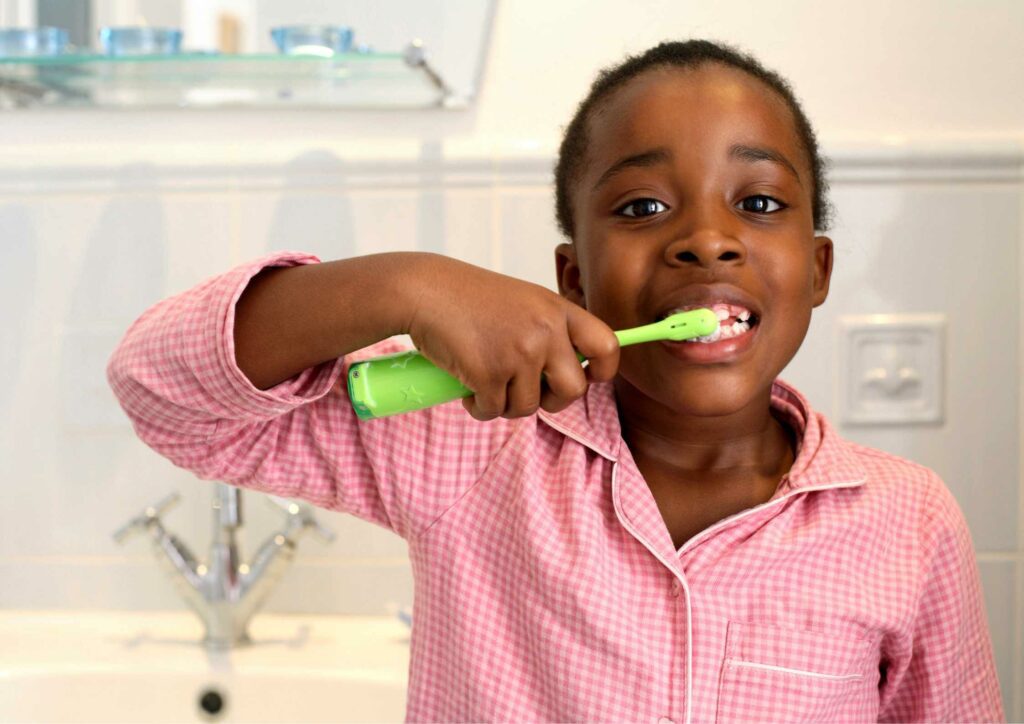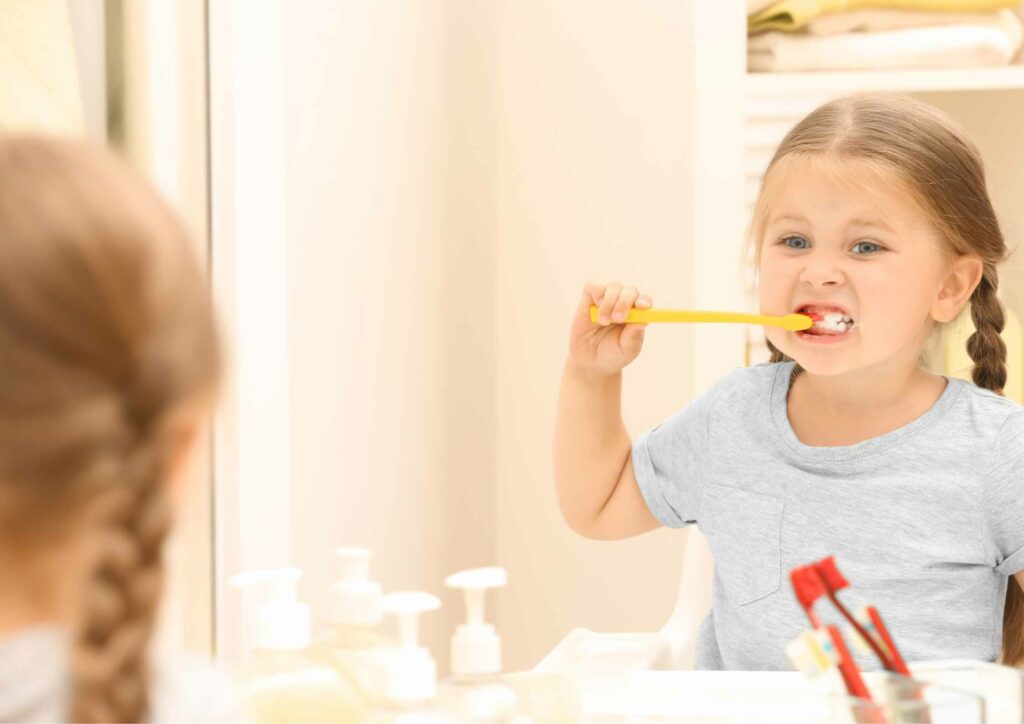Early home care and oral hygiene habits play a huge role in a child’s developing smile. Instilling the right self-care habits from a young age is paramount to the long-term oral health for children because it affects them for the rest of their lives. One of the most basic yet essential tools for maintaining good oral hygiene is the toothbrush.

When it comes to pediatric patients, selecting the right toothbrush is vital in ensuring effective and enjoyable brushing experiences. All of that starts with selecting the best toothbrush for children at their specific age and developmental phase.
The Importance of Using the Right Toothbrush
Preventative dental care sets the foundation for a lifetime of healthy smiles. Encouraging proper brushing techniques and consistent dental care practices during childhood can prevent most dental issues, such as cavities and gum disease, later in life. The better equipped parents and caregivers are when it comes to nurturing their child’s dental health, the fewer dental treatments those children will usually need.
Choose an Appropriately Sized Toothbrush
Selecting the right toothbrush size is fundamental for kids, as it directly impacts the child’s ability to effectively clean their teeth. A toothbrush that is too big may lead to difficulties in reaching all areas of the mouth or skipping over teeth altogether.
Age-appropriate toothbrushes
When selecting or recommending specific toothbrushes, it’s essential to consider the child’s age. For toddlers and young children, opt for toothbrushes designed specifically for their age group. These toothbrushes typically feature smaller heads and ergonomic handles, making them easier for tiny hands to grip.
Soft-grip handles
Many toothbrushes for kids come with soft-grip handles, providing better control and maneuverability. This feature is particularly useful for children who are just starting to brush their teeth independently.
Replaceable toothbrush heads
Some electric toothbrushes have replaceable heads, which can be more cost-effective for parents in the long run. It also reduces waste, as only the head needs to be replaced, not the entire toothbrush.
Opt for Softer Bristles
The texture of the bristles on a toothbrush plays a significant role in maintaining oral health. While adults may prefer firmer bristles for a thorough clean, it is crucial to use softer bristles for children.
Gentle on young teeth and gums
Children’s teeth and gums are more delicate than those of adults. Using soft-bristled toothbrushes helps prevent gum irritation and enamel abrasion, especially for children who brush with more enthusiasm.
Plaque removal
Soft bristles are more effective in removing plaque from the tooth’s surface while being gentle enough not to cause any damage. Proper plaque removal is critical in preventing cavities and gum disease.
Age-specific bristle designs
Toothbrushes for different age groups often come with varying bristle designs. For younger children, consider toothbrushes with rounded bristle tips to ensure safe and effective cleaning.
Tips for Getting Kids to Brush Their Teeth
Convincing some kids to brush their teeth can be a challenging task. Here are some practical tips to make the process enjoyable and encourage positive dental habits:
Make brushing a fun experience
Turn brushing into a game or challenge by incorporating music, timers, or even a rewards system. Engaging children’s imagination can help them look forward to brushing their teeth. Some children’s toothbrushes even match up with smartphone apps to encourage healthy brushing habits.
Lead by example
Children often imitate their parent’s behaviors. Demonstrating proper brushing techniques and enthusiasm for dental care can motivate children to do the same for themselves.
Let them choose their toothbrush
Involve children in the toothbrush selection process. Letting them choose a toothbrush with their favorite colors or cartoon characters can create a sense of ownership and excitement. Just make sure it’s the right size, first!
Brush together
Brushing as a family can make the experience more enjoyable and reinforce the importance of dental hygiene as a shared responsibility. It’s also easier for everyone to stay on track for the recommended two minutes.
Educate and empower
Explain to children the importance of brushing their teeth and how it helps keep their smiles healthy and bright. Empowering them with knowledge can instill a sense of responsibility for their oral health. Using disclosing tablets can help kids visualize where plaque is at on their teeth, improving their brushing overall.
Early Dental Appointments: A Cornerstone of Lifelong Oral Health
Dentists and parents alike hold the responsibility of shaping the oral health journey of young patients. Scheduling early dental appointments—before issues start—helps lay the foundation for a lifetime of good oral hygiene, allows for early intervention, and establishes positive dental experiences. By prioritizing early dental care, dentists and parents can make a significant impact on the long-term oral health and overall well-being of young children.

Establishing a Positive Dental Experience
A “happy” or “fun” first encounter with a dental office—as opposed to an emergency exam or because of a toothache—is one of the best ways to help children view dental care in a positive light. Scheduling early dental appointments, ideally by the age of one or within six months of getting their first tooth, allows dentists to create a positive and comfortable environment for our young patients. These initial visits focus on preventive care, oral hygiene education, and addressing any parental concerns, setting the stage for a lifetime of positive dental experiences.
Early Detection and Intervention
Regular early dental appointments facilitate the timely detection of any dental abnormalities or developmental issues, such as malocclusions, jaw misalignments, or early signs of cavities. Early intervention can significantly reduce the need for extensive treatments in the future and promote optimal skeletal growth and oral development.
Promoting Parental Education
Early dental appointments offer an excellent opportunity to educate parents and caregivers about their child’s oral hygiene, nutrition, and oral habits. By empowering parents with knowledge early on, everyone benefits.
Building Long-Term Relationships
Initiating dental visits at a young age allows dental providers to build lasting relationships with young patients and their families. This continuity of care fosters trust and enables us to tailor treatments according to the child’s unique needs as they grow.
Good Oral Hygiene Habits Last a Lifetime
As dental providers, we have a unique opportunity to positively influence our pediatric patients’ oral health by guiding parents and caregivers in selecting the best toothbrush for their children. Emphasizing the importance of an appropriate toothbrush size and soft bristles will ensure effective cleaning without causing harm to young teeth and gums.

Implementing creative strategies to encourage kids to brush their teeth can set the foundation for a lifetime of good oral hygiene practices. By working together with parents and caregivers, we can nurture a generation of children with healthy and happy smiles.





















